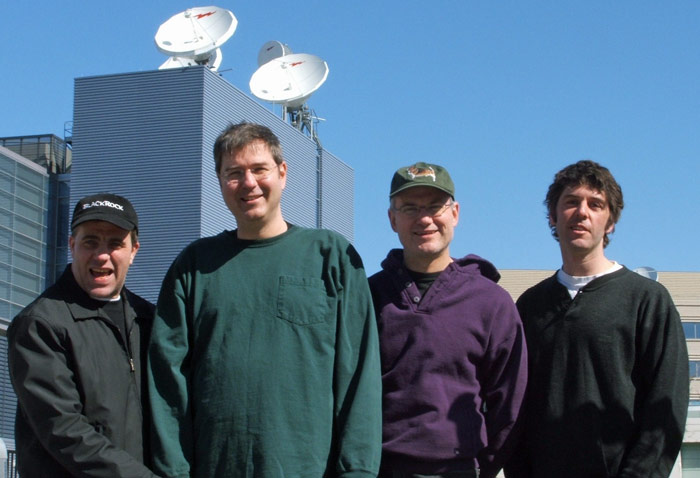
Stardust Memories
by Eric Davidson
Big Dipper’s lineage is an indie-rock roots cornucopia. The band—guitarists Gary Waleik and Bill Goffrier, drummer Jeff Oliphant, and bassist Steve Michener (later replaced by Tom Brewitt)—formed in 1985 from remnants of The Embarrassment and the Volcano Suns. And like those combos, Big Dipper has remained a cult fetish for those enamored of that era when indie rock more fully embraced the second half of that genre tag. By grafting the nervous energy of their post-punk ancestry onto looping hooks and surreal lyrics that read like some post-grad thesis and presenting it onstage in cardigans and clunky shoes, they created a “geek rock” template that was sonically as wide open as a suburban summer sky at night.
Merge’s amazing three-CD retrospective, Supercluster, had the band coming together for some reunions in 2008, and the time together has evolved into the first new Big Dipper album in 22 years, Crashes on the Platinum Planet, on Almost Ready. The record finds the band’s crafty melodies and oddball observances understandably less manic, but just as catchy. I recently caught up with Waleik via email to, uh, catch up.
Let’s get the obvious out of the way: why now, why the reunion? Did getting some shows under your belt in the wake of the Supercluster comp kickstart the idea?
Gary Waleik: I wouldn’t call this a reunion really. In 2008, it was a reunion because it was the original line-up celebrating its past in connection with the release of Supercluster. Over the last four years, we’ve convened only very sporadically to record some new songs, and to our amazement (and shock and maybe even horror), we’ve come up with enough good songs for a record. We’ll play some shows to support the release, but I would not call it a reunion.
Crashes on the Platinum Planet shows that the dexterous vocabulary of the band has certainly not slipped in the intervening years. What books have you been reading as of late or what other influences have seeped into Big Dipper’s lyrical world?
GW: I’ve been reading Jonathan Lethem, Jewish mystics, WC Heinz and probably a lot more non-fiction than I used to. So I guess my lyrics have a more realistic surrealism to them, if that makes any sense. I can’t speak for Jeff or Bill.
Listening to the new album, the fun, oddball phrasings and hooks are all there, then “Happy New Year” comes along and gets me thinking that it’s maybe the most pretty and saddest tune you’ve ever released.
GW: I think that was written by Bill when things were not going as well in his life as he would have liked. Once he got through the sadness, he emerged with punk guns ablazing. Listen to the lyrics of “New Machine” and “Pit Bull Cruiser” for the proof!
Robert Pollard: a contemporary, protege, or influence for Big Dipper? (The song “Robert Pollard” is the first single off Crashes on the Platinum Planet.)
GW: Definitely not a protege. He needs no protection or guidance from anyone. He is, however, a contemporary and an influence. And the influence is reciprocal. I’m still blown away that he likes Big Dipper.
Can you tell me about the making of the “Faith Healer” video?
GW: We got a budget for that from Homestead and contacted a filmmaker we knew named Kelly Reichardt. Bill did the storyboard and some of the props, and we improvised as we went along—and danced a lot. We filmed in some industrial space in South Boston and had a blast doing it. It actually got played a bunch of times on MTV, so it was a worthwhile project.
While Heavens is a highly underrated, indie rock masterpiece, and I think Craps is much better than its weird rep, I wonder what you think of Slam (the band’s ill-fated 1990 major label debut and last album) these days? Can you tell me what state the band was in at the time, the recording process, and how you were feeling about it when it came out?
GW: We had a blast recording Slam and felt really good about it when it came out. It’s the way all parents feel about their children at the outset. Since then, our opinions have diverged. Steve thinks it’s a great record. I disagree. I think a few of the songs are wonderful, but the record is not a good one. It was the wrong record for us at exactly the wrong time.
How did you get together with Almost Ready Records?
GW: Harry Howes had reissued The Embarrassment’s “Sex Drive” 45, and Bill had a good experience with that. Almost Ready was the only label we could find that had any confidence in us at all, so we went with that label.
Do you still work for NPR? What do the other Dippers do to pay the bills?
GW: Yes, I produce NPR’s weekly sports program, Only a Game. Bill teaches art in the Boston area; Steve’s a nurse in Oregon; Tom’s a stay-at-home dad; and Jeff is a mover and shaker in the world of high finance.
Considering Big Dipper was “indie rock” before it became whatever the hell people canonize it as today, what would you call Big Dipper, genre-wise, if you were a 25-year-old today stumbling upon Heavens?
GW: Pop music. Eccentric pop, but definitely pop music.
